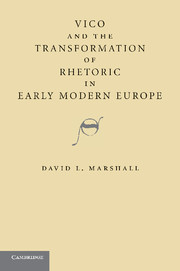3 - Redacting the Art of Persuasion
Published online by Cambridge University Press: 06 July 2010
Summary
When Vico took up the position of professor of rhetoric at the University of Naples in 1699, the discipline was already in decline. Many scholars have attempted to explain this eclipse of rhetoric. For Roland Barthes, it was the rise of three new forms of “evidence” – an immediacy of proof that requires no particular linguistic presentation – in the religious sphere with Protestantism, in philosophy with Cartesianism, and in the sciences with empiricism. Likewise, according to Todorov, an emphasis on inspiration personelle could be taken to render issues of rhetorical form obsolete. Schmidt-Biggemann has emphasized the failed investment of rhetorical energies in a sixteenth- and seventeenth-century topica universalis that was supposed to drive an encyclopedic renovation of knowledge but that in the end proved utopian and delusory. In the opinion of Ricœur (and many others), rhetoric became attenuated, removed ever more from practical exigencies of argument and composition, concerned disproportionately with the mere classification of figures. And in a much-cited article, Wellbery and Bender have spoken of the early modern conditions of rhetoric's impossibility: ascendant scientific “objectivity” with its concomitant values of transparency and neutrality, a new emphasis on individual originality that displaced classicizing modes of imitatio, liberalism's displacement of republicanism in political theory, the dominance of literacy over orality, and the rise of the vernacular language nation-state.
Some scholars have also emphasized that the decline of rhetoric coincided with the emergence of a number of other disciplines.
- Type
- Chapter
- Information
- Publisher: Cambridge University PressPrint publication year: 2010



